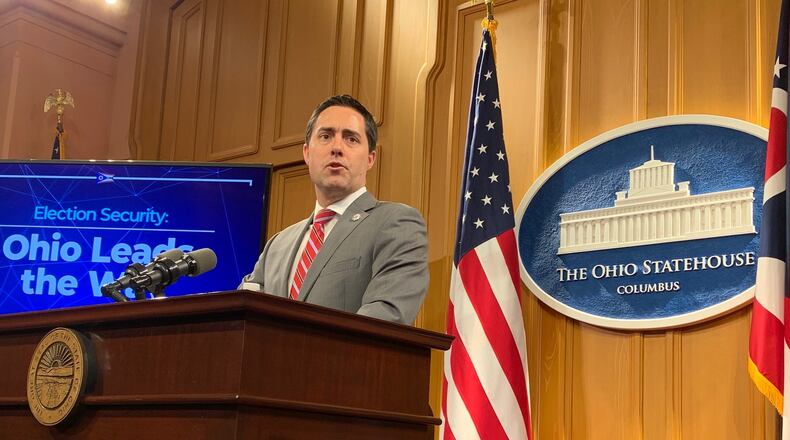LaRose said all 88 Ohio counties are 100 percent compliant with orders to conduct physical security checks, personnel background checks, transition to .gov email and website domains and training for staff. The compliance rate for required cyber attack detection and network defense steps is 99 percent, he said.
“Ohio is the best prepared state of any state in the nation. That was my goal from the beginning. That’s what we expect as buckeyes, that’s what we expect as Ohioans. We know that the eyes of the world are on us each time we conduct a presidential election in Ohio. When the world is watching, Ohio will be ready,” LaRose said.
LaRose reported that Clark, Warren, Hamilton, Ottawa, Carroll, Holmes and Trumbull counties are not in compliance but expected to meet requirements soon. Some counties, such as Clark, are ironing out issues with vendors while others, such as Warren, are working with state and local officials on the outstanding issues, he said.
RELATED: Local counties meet election cyber security deadline
LaRose set Jan. 31 as a deadline for counties to comply with a 34-point security checklist to defend against attacks on election infrastructure.
“I’d say we are 99 percent compliant,” Brian Sleeth, director of the Warren County Board of elections said Wednesday.
Sleeth said his office was working with the vendor on server requirements and waiting for the Secretary of State’s Office to tell them the county was complying with requirements for a device monitoring digital traffic.
“We’ve been in constant contact with the Secretary of State’s Office,” Sleeth said. “It will be compliant before early voting occurs.”
Counties submitted progress reports to LaRose’s office last week.
RELATED: What local counties are doing to protect your vote
The Ohio Secretary of State’s Office offered one-time, $50,000 grants to assist counties implementing the security changes. In 2017, the United States Department of Homeland Security designated U.S. election systems as part of the nation’s critical infrastructure and the next year Congress appropriated $380 million in grants to the states to secure and improve election systems.
LaRose said he expects Ohio will receive another round of federal grant funding for further work.
LaRose said the cyber security checks help combat misinformation campaigns that undermine voters’ confidence in elections. The truth is the best antidote to misinformation and it is “deeply irresponsible” to share conspiracy theories and false information about elections, he said.
In response to a journalist’s question about President Trump’s claims on Twitter about voter fraud, LaRose said “I’m not responsible for the president’s decision making process or his social media strategy. But I will say that nobody is immune from what I just said: it is irresponsible to fear monger about elections administration. It doesn’t matter who you are. And certainly if you have the largest megaphone in the world, that you should think very carefully before you say something that would cause people to lose faith in elections.”
GET READY FOR ELECTION DAY
- The deadline to register to vote for the Ohio primary election is Feb. 18.
- Early voting starts on Feb. 19.
- The Ohio primary is set for March 17.
LATEST NEWS
Stay up to date on the upcoming election on our Ohio Politics Facebook page
About the Author

